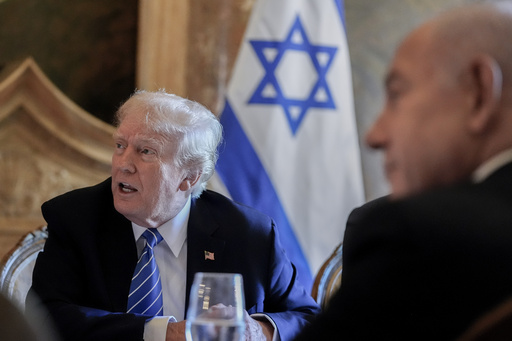
WASHINGTON — U.S. presidents have traditionally embraced their roles as leaders of the free world, overseeing a powerful democracy and military that allies globally can trust for support. However, this perspective is shifting under President-elect Donald Trump, known for his critiques of numerous existing American alliances. The recent outcome of his second term election has prompted close European partners to advocate for a new phase of self-reliance, no longer contingent on U.S. goodwill.
French President Emmanuel Macron emphasized this sentiment during a European summit, asserting, “We must not delegate forever our security to America.” Given Trump’s previous term and his statements throughout the campaign, many anticipate that U.S. foreign policy will become less predictable, with a noticeable shift toward a colder demeanor toward allies, increased warmth toward certain authoritarian leaders, and a more transactional approach to global relationships. This change will likely have a profound effect on America’s involvement in international affairs and security, echoing sentiments from both supporters and critics of Trump.
Supporters argue that Trump will simply be more selective regarding American alliances and engagements compared to earlier administrations. Fiona Hill, a former adviser on Russian affairs under Trump and previous presidents, suggests that the notion of the U.S. as the leader of the free world may not hold. “Maybe ‘the free-for-all world, his leadership?’” Hill remarked in a recent podcast, questioning the nature of U.S. leadership under Trump’s guidance.
Trump’s inconsistent criticism of NATO, alongside concerns regarding support for Ukraine and Taiwan—democracies threatened by Russia and China—illustrates a departure from the traditional American role as a bond for strategic alliances. In anticipation of another Trump term, allies and adversaries have been reevaluating their security strategies. Particularly in Europe, nations have taken steps to reinforce their defenses independently, reducing their reliance on the U.S. as NATO’s foundational component. Immediately following Trump’s victory over Vice President Kamala Harris, defense leaders from France and Germany convened to discuss the implications.
Leaders such as Israeli Prime Minister Benjamin Netanyahu and Russian President Vladimir Putin appear to be crafting military strategies with the prospect of a Trump presidency in mind, which might afford them more freedom of action. Victoria Coates, a security adviser during Trump’s first term, disputes the characterization of him as an isolationist. “He is extremely judicious about the application of the American military and about potentially getting embroiled in conflicts we can’t resolve,” Coates indicated on a security podcast recently.
Coates cited Trump’s backing of Israel in its conflicts against Iranian-aligned groups as evidence of his global engagement. She described Iran’s nuclear ambitions as the “greatest concern” internationally, pointing out that any advancements in its nuclear program could prompt a more vigorous U.S. response than seen during his first term, which was characterized by escalated sanctions under a “maximum pressure” campaign.
Trump has been particularly vocal regarding U.S. support for Ukraine, hinting at potential changes in policy. Philip Breedlove, a former top NATO commander, highlights both the opportunities and serious concerns that may arise for Ukraine and NATO under Trump’s leadership over the next four years. While Trump’s remarks about NATO were often severe during his first term, they did not translate into actual troop reductions or diminished support for the alliance. Currently, 23 NATO countries are meeting the guideline of spending at least 2% of their GDP on defense, a significant increase from just 10 in 2020, which counters one of Trump’s long-held grievances.
However, Breedlove expresses alarm over Trump’s promise to end the conflict in Ukraine swiftly. “Ending wars on terms that are appropriate is one thing. Capitulating to an enemy in order to stop a conflict is a different thing. And that’s what worries me,” he said. This sentiment resonates particularly amid fears that granting Russia additional territory in Ukraine would set a precedent, emboldening Putin’s ambitions toward European nations.
The implications for Taiwan, which has long faced the threat of invasion by China, also weigh heavily on the circumstances. Trump’s inconsistent remarks about Taiwan’s defense, including suggestions that it should financially support U.S. protection, reflect a concerning unpredictability. Paul Nadeau, an assistant professor specializing in international affairs, notes, “His reliance on unpredictability in a finely balanced situation is worrisome.” The delicate balance among Taiwan, the U.S., and China relies on careful signaling, which could be jeopardized.
The geopolitical landscape has evolved as well, with Russia, North Korea, Iran, and China forging a loose alliance that challenges Western interests. In regions where the U.S. has scaled back its presence, these adversarial nations have swiftly sought to enhance their influence, particularly in the Middle East. During his prior term, Trump frequently advocated for withdrawing U.S. troops from Iraq and Syria, often causing confusion among Pentagon officials with abrupt statements.
An outcry from certain Republican lawmakers and alternative proposals from military leaders curtailed complete troop withdrawals, leading to a continued U.S. presence in Syria with around 900 troops stationed there. Meanwhile, troop levels in Iraq have been diminishing as a result of agreements made between the Biden administration and Iraqi leaders aimed at concluding the U.S.-led coalition’s mission against the Islamic State by next year. This plan could lead to certain U.S. forces redeploying within northern Iraq to assist regional anti-IS efforts in Syria.
Trump’s previous administration, coupled with Biden’s foreign policy steeped in unsuccessful ceasefire efforts in the Middle East, has prompted allies to consider consolidating their military capabilities and fostering regional coalitions for enhanced security. “There’s going to be less United States than before on the world stage,” Hill said. “There can’t be this dangerous dependency on what happens in Washington, D.C.”
